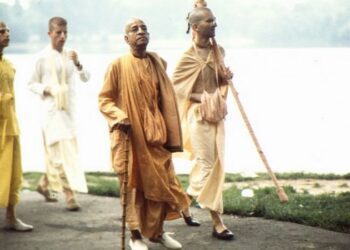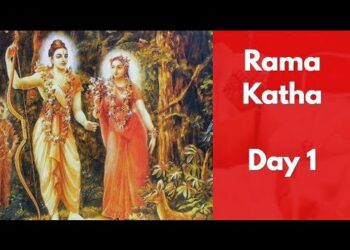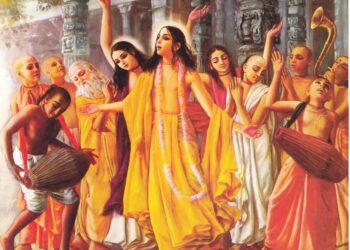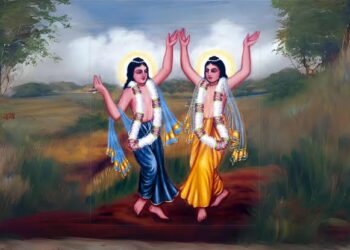Transcript
Prabhupāda: Yes, this is the third time.
Cardinal Danielou: Yes, yes.
Prabhupāda: I have come here today.
(break)
Prabhupāda: Vṛndāvana.
Cardinal Danielou: Yes, sir.
Prabhupāda: You know Vṛndāvana?
Cardinal Danielou: In the north, North India.
Prabhupāda: North India.
Cardinal Danielou: North India, North India. Yes. You have here the center of your . . .?
Prabhupāda: Yes, I have got my center here.
Cardinal Danielou: . . . (indistinct)
Prabhupāda: Yes. What is the address, our center?
Yogeśvara: It’s quatre, Rue le Sueur.
Cardinal Danielou: (French) You have the temple of Kṛṣṇa?
Yogeśvara: Yes.
Cardinal Danielou: But you have a community in Paris?
Yogeśvara: Yes.
Prabhupāda: We shall install Deity tomorrow morning. So . . .
Cardinal Danielou: Yes, you . . .
Prabhupāda: Have you got time to attend?
Cardinal Danielou: Yes.
Yogeśvara: (translates into French)
Cardinal Danielou: Ah . . . I don’t know. Perhaps. What, what, what, at quelle heure, what time?
Yogeśvara: Nine o’clock.
Cardinal Danielou: Nine o’clock, nine o’ clock. Nine o’clock is perhaps difficult.
Prabhupāda: Nine . . .
Cardinal Danielou: Nine, it is . . .
Prabhupāda: Nine to twelve, the ceremony . . .
Cardinal Danielou: Ah, nine to twelve. Perhaps. In the end of the morning, perhaps it is . . . it is an inauguration. Inauguration?
Prabhupāda: Yes. Deity installation.
Bhagavān: We have the beautiful form of Kṛṣṇa, Lord Kṛṣṇa . . .
Cardinal Danielou: (indistinct) . . . of Kṛṣṇa. Yes, yes.
Bhagavān: . . . installed in our temple.
Cardinal Danielou: Yes . . . (indistinct) . . . this is very, very, very beautiful. Yes, I would be very glad to visit you. You was in the Hotel de Ville of Paris this afternoon?
Yogeśvara: Yes, we just came from the Hotel de Ville.
Cardinal Danielou: Yes, yes, yes. A very nice reception, the Hotel de Ville.
Bhagavān: Prabhupāda . . . Prabhupāda spoke on our philosophy of Bhagavad-gītā.
Cardinal Danielou: Oh, Bhagavad-gītā, yes, yes, yes . . .
Bhagavān: People were very interested. Our spiritual concept of soul, he spoke on.
Cardinal Danielou: Yes. It is a . . . personally, I like very much Hinduism. And I have a brother, Alain Danielou, it is my brother, who is a specialist on Hinduism . . .
Bhagavān: Yes, his brother has written a very great book which is known all over France . . .
Cardinal Danielou: Especially on Indian music. Indian music. He live many years in Benares.
Prabhupāda: Benares.
Cardinal Danielou: Benares. Fifteen. Fifteen years in Benares.
Prabhupāda: Oh, he was in fifteen years?
Cardinal Danielou: Oh, yes, a very very long time. Oh, yes. Very long time. Yes. And after he, he worked in Pondicherry, and each year he comes in India. Yes. Yes. He’s very well known in India for his works, especially about Indian music, but also Indian spirituality, the yogas, Indian gods and all question concerning India. Yes.
Prabhupāda: Where he is now?
Cardinal Danielou: He’s now in Rome, in Rome, in Rome. He, he had especially in Greece language, not in French. He lived in Rome, in Berlin. You visited Italy, Italy, yourself?
Prabhupāda: Not yet.
Cardinal Danielou: No. Not yet, not yet. France. France . . .
Prabhupāda: I’ve got invitation from the secretary . . .
Cardinal Danielou: Yes.
Bhagavān: We are beginning one branch in Italy.
Cardinal Danielou: Yes, yes, yes, yes.
Bhagavān: Your brother, he has acquired a little philosophy from India.
Cardinal Danielou: Yes, yes, very acquainted with Indian philosophy and religion. He read very well Sanskrit and . . .
Prabhupāda: Oh, he knows Sanskrit?
Cardinal Danielou: Oh, yes, oh, yes. He knows very, very well, oh, very well. He speaks Indian modern language, Hindi, Bengali and Tamil.
Prabhupāda: Bengali?
Cardinal Danielou: Bengali. And Tamil.
Prabhupāda: I am Bengali.
Cardinal Danielou: (laughs) It is . . .
Prabhupāda: He’s a linguist scholar.
Cardinal Danielou: Yes, very scholar. It is first time you visit the France?
Prabhupāda: This is the third time.
Bhagavān: Third time, trois.
Cardinal Danielou: Trois fois, trois fois, trois fois.
Yogeśvara: Our spiritual master was very interested when I informed him that you have had several meetings with political leaders of France as well, that you have . . . that your interests extend into government and politics as well as religion.
Cardinal Danielou: Yes, yes.
Prabhupāda: So our Vedic conception of politics, the king is the representative of God.
Cardinal Danielou: Yes?
Prabhupāda: King.
Cardinal Danielou: King, yes.
Prabhupāda: In the Bhagavad-gītā . . .
(aside) Bring glass of water.
Bhagavān: We can get glass of water?
Frenchman: Yes.
Cardinal Danielou: Glass . . .
Bhagavān: Do you understand English enough to . . .?
Cardinal Danielou: Yes, I understand, very well I understand some . . .
Prabhupāda: The king . . . this creation, God created this material world. What is the purpose? What is the purpose of creation? There must be some plan. When you manufacture something, do something, there must be plan. So what is the plan behind this cosmic manifestation?
Cardinal Danielou: Yes. What is this plant lan? Yes. Yes, sir. Yes.
Prabhupāda: What Christianity says about this plan?
Cardinal Danielou: Christianity thinks that creation is the work of the love of God, and the signification of creation is that God wants to partake His richness, His joy, His beauty with free spirit, and the goal of the creation is essentially the realization of this communion with God. The communion with God. Alors, the visible world is without great importance. It is an appearance. But there is a reality in human person, in human personality, because human personality is . . . has a . . .
Yogeśvara: If you like, I can translate. (French: suggesting he translate so the other people can understand)
Cardinal Danielou: Oui. You understand, you understand what I say? Or not very well? (French)
Prabhupāda: So the creation . . . we are, we all living entities, we are also part and parcel of God.
Yogeśvara: (translates)
Cardinal Danielou: Oui.
Prabhupāda: Just like this finger . . .
Cardinal Danielou: Yes, yes, is a . . .
Prabhupāda: Part and parcel of this body. Similarly, everything . . .
Cardinal Danielou: Is a part.
Prabhupāda: Part and parcel of God.
Cardinal Danielou: Yes.
Prabhupāda: So the part and parcel of the God, the living entity, its business is to render service to God.
Cardinal Danielou: To render . . .?
Yogeśvara: (translates)
Cardinal Danielou: Yes, yes, yes. I agree, I agree.
Prabhupāda: Just like this finger is part and parcel of my body, but its business is to serve the body. I ask the finger, “Come here.” It is doing like that. I ask the finger to come here; it is doing like that. So it is the business of the finger is to serve the whole. It is part. And the body is the whole. So therefore the business of the part and parcel is to serve, render service, to the whole. This is natural condition.
Yogeśvara: (translates)
Cardinal Danielou: I agree with this . . .
Prabhupāda: Let me finish.
Cardinal Danielou: Yes. And I think that the vocation of each creature is the service of God, yes.
Prabhupāda: Yes.
Cardinal Danielou: The service of God.
Prabhupāda: Yes. So when the living entity forgets this business, that is material life.
Cardinal Danielou: That is . . .?
Yogeśvara: (translates)
Cardinal Danielou: (agrees in French)
Prabhupāda: Therefore in this material world we find almost everyone has forgotten God.
Yogeśvara: (translates)
Cardinal Danielou: (agrees in French)
Prabhupāda: The conclusion is that this material world is created . . .
Cardinal Danielou: Created . . .
Prabhupāda: Created for the forgotten souls.
Yogeśvara: (translates)
Cardinal Danielou: Yes.
Prabhupāda: And here the business is to again revive them to God consciousness.
Yogeśvara: (translates)
Cardinal Danielou: Yes.
Prabhupāda: So the process of enlightening the living entities, especially the human being . . . because in the animal form of life, one cannot be enlightened. Neither the animal can understand what is God.
Cardinal Danielou: No, can’t understand. Yes, yes, yes, yes.
Prabhupāda: It is only the human being who can understand. If he’s trained, then he can come to God consciousness.
Cardinal Danielou: Yes, yes, yes, yes. It is so.
Prabhupāda: So this creation is meant for the forgotten souls to give them a chance for reviving their God consciousness.
Yogeśvara: Is it clear?
Cardinal Danielou: Yes, it is clear. It is very, very clear. Very clear.
Prabhupāda: And for this business, sometimes God personally comes; sometimes He sends His representative, His son, or His devotee, His servant. This is going on. God wants that these forgotten souls should come back to home, back to Godhead.
Cardinal Danielou: Yes, return. Yes.
Prabhupāda: Therefore from His side, there is constant endeavor to revive their God consciousness.
Cardinal Danielou: Yes, God consciousness.
Prabhupāda: Now this God consciousness can be awakened in the human form of life, not in other form of life.
Cardinal Danielou: Not in the . . . (indistinct) . . . yes.
Prabhupāda: Maybe very rarely. But the human being . . .
(aside) Where is the water?
Yogeśvara: She said she was coming with it.
Prabhupāda: Ācchā. The human being has got the prerogative to awaken his dormant God consciousness.
Yogeśvara: (translates)
Cardinal Danielou: Yes.
Prabhupāda: So the best service to humanity is to awaken their God consciousness.
Cardinal Danielou: Yes, it is true, it is true.
Prabhupāda: Best service.
Cardinal Danielou: It is the necessity of internal conversion, yes, for human . . . human souls to return to God. But do you think that this . . . the personality of human soul is a personality of permanent? That is, we remain always distinct—not separate from God, but distinct of God?
Prabhupāda: Distinct.
Cardinal Danielou: Distinct of God. Yes.
Prabhupāda: Just like you are distinct from me, I am distinct from you.
Cardinal Danielou: Yes, yes, yes.
Prabhupāda: Like that.
Cardinal Danielou: We are distinct from God in a certain sense.
Prabhupāda: Yes but as I am the individual being, similarly God is also individual being.
Cardinal Danielou: Individual being, yes, yes.
Prabhupāda: Being. That is the Vedic statement: nityo nityānāṁ cetanaś cetanānām, eko bahūnāṁ yo vidadhāti kāmān (Kaṭha Upaniṣad 2.2.13), that God is also a living entity.
Cardinal Danielou: Living, God is living.
Prabhupāda: Living entity.
Cardinal Danielou: Living, living.
Prabhupāda: And we are also living entities. But He’s singular number; we are plural number.
Yogeśvara: Il est unique, nous sont nombre.
Cardinal Danielou: But do you think that really God love human beings and . . .?
Prabhupāda: God loves . . .
Cardinal Danielou: Love . . .
Prabhupāda: . . . every living entity.
Cardinal Danielou: God love, love, love . . .
Prabhupāda: Not only human beings, but also . . .
Cardinal Danielou: And you think that the origin of creation is . . . comment dit en le pecher?
Yogeśvara: Do you believe that the origin of this creation is a sin?
Cardinal Danielou: Is a sin, a sin . . .
Yogeśvara: A sin.
Cardinal Danielou: A sin of man or is the love of God? What is the origin?
Yogeśvara: Is this creation . . .?
Prabhupāda: When, when the living entity forgets love of God, he’s given this material world.
Cardinal Danielou: Yes, yes, I agree. Christianity agrees with this.
Prabhupāda: The exact word, in Bengali, there is a poet:
kṛṣṇa-bhuliyā-jīva bhoga vāñchā kare
pāśate māyāra tare jāpaṭiyā dhare
(Prema-vivarta 6.2)
As soon as the living entity forgets his position as eternal servant of God, and he wants to imitate God, to enjoy, at that time, māyā, illusion, or Satan captures him. Captures him.
Cardinal Danielou: Yes. Is true. The man must imitate God, imitating His bounty, his . . .
Prabhupāda: Power.
Cardinal Danielou: Yes. His mind and His knowledge of the spiritual sense. But it is possible to man without the helping of God to realize his perfection?
Prabhupāda: No, no, no.
Cardinal Danielou: It is necessary that the grace of God help the . . .
Prabhupāda: Yes. By the help of God, he can revive. That is stated in Caitanya-caritāmṛta . . .
Cardinal Danielou: Because man is, himself, is not capable to attain . . .
Prabhupāda: No.
Cardinal Danielou: . . . the divinity.
Prabhupāda: By the help of Kṛṣṇa . . .
Cardinal Danielou: (aside in French)
Prabhupāda: By the help of God, and by the help of master, spiritual master . . .
Cardinal Danielou: Yes, yes. Spiritual master.
Prabhupāda: Yes.
Cardinal Danielou: Spiritual master is very important. The guru, you say, yes.
Prabhupāda: Guru, yes. That is the very word used. Guru-kṛṣṇa-kṛpāya pāya bhakti-latā-bīja (CC Madhya 19.151). One revives his God consciousness by the mercy of God and guru.
Cardinal Danielou: Yes, in Christianity, we speak of spiritual fathers.
Prabhupāda: Yes.
Cardinal Danielou: Spiritual father, spiritual father. We . . . is a man who has a good experience of spiritual things and communicate his experience to others, you know.
Prabhupāda: Yes, oh, yes.
Cardinal Danielou: You know. We have in Christianity monks, monks. We live in monastery.
Prabhupāda: Ah, monks.
Cardinal Danielou: Monastery, yes, with contemplative life and austerity of life. And we have many, many monastery in France. Some Benedict, some Benedict and . . .
Prabhupāda: Where he has gone to take the water? From Arabian Sea?
Devotee: (indistinct) . . . girl said she was just going to got to get it at the kitchen.
Cardinal Danielou: (French)
Yogeśvara: Kṛṣṇa’s mercy. I can change the tape. (break)
Cardinal Danielou: . . . leader of the Kṛṣṇa community?
Prabhupāda: Yes.
Cardinal Danielou: Yes, yes. But there are in India other community of Viṣṇu . . .?
Prabhupāda: The same, the same.
Cardinal Danielou: The same.
Prabhupāda: Kṛṣṇa and Viṣṇu, the same.
Cardinal Danielou: The same, the same, the same, the same.
Yogeśvara: Here’s some water.
Cardinal Danielou: Water. (French)
Yogeśvara: That’s okay. Would you like some water yourself?
Cardinal Danielou: (French)
Prabhupāda: So material world is meant for persons . . . take it.
Cardinal Danielou: Thank you.
Prabhupāda: You can give me little more. Yes.
Cardinal Danielou: You have in India today a religious life, or . . .?
Prabhupāda: Yes, I’m sannyāsī.
Cardinal Danielou: But there is no, no atheism, illiterate, some atheism, atheism, atheism—religious indifference. Materialists exist in the towns, in the towns . . .?
Prabhupāda: Now there are many atheist.
Cardinal Danielou: Many atheists, yes. In France, we have this problem. In France, the greatest parts of the . . . of, of children are baptized and trained . . .
Prabhupāda: (aside) Give me little more.
Cardinal Danielou: In France, the greatest part of children are baptized and received a religious education, the religious training, the great part. The atheism is chiefly amongst intellectual, not . . .
Prabhupāda: Ah! Not in the mass.
Cardinal Danielou: Not in the . . . no, not in the mass.
Prabhupāda: The same thing . . .
Cardinal Danielou: The intellectuals are always a little extravagant. (laughs) And the mass, the mass, remain religious. Yes, yes. Very religious, very religious.
Yogeśvara: But still we find that the French young people today are at the head of all the revolutionary philosophies and movements.
Cardinal Danielou: Yes. Yes. But it is not the majority of the young men, and this revolutionary spirit is, amongst many youth, some research, research of the Absolute. Some young men are Communist and Marxist, surely. But many youths today have a spirit of research factually. In . . . insatisfied with actual religious forms, and receives any religious experience, a spiritual experience . . .
Prabhupāda: That is the latest thing. They are now disgusted with these religious rituals without philosophy.
Yogeśvara: (translates)
Cardinal Danielou: Oui, yes, it is so, it is so. They have accepted some formalism, ritualism. They do not like this, but receives a personal and internal experience.
Prabhupāda: Yes.
Cardinal Danielou: But you have a great interest in France amongst the yoga, monk, Indian method of prayer. A great interest. And we, we think that the method of prayer are the same in the various religion. We have in Christian faith method of meditation of interior, interiorite, of silence.
Bhagavān: What is the . . . what is the program that Christianity has for giving people in general this experience that they’re missing?
Yogeśvara: (translates)
Cardinal Danielou: Oui. Bien. C’est . . . nous avons . . . we have today many community of prayers, where young men go together and in the monastery or in the . . . n’est ce pas? And pray together with alternative of silence and of lectures, of some text of the Bible and of the gospel, you know. Because we, we think that the life of Jesus is the model, or the shape, and we like that Jesus is the manifestation of God. He is the way. The way.
Because it is necessary to find God, who is hidden, to have a way, to have a way. And for ourself, Jesus is the way to go to the hidden God, you know, you know. The imitation of Jesus is, for a Christian, the ideal, imitation of his poverty, of his goodness, of his love of God.
Yogeśvara: He says the ideal of Christianity is to imitate these various qualities of Lord Jesus Christ.
Prabhupāda: Yes.
Cardinal Danielou: Yes. I think it is the character specific of Christianity, the importance of the person of Jesus. Jesus is the perfect model, you know, of the virtues, and it is apply the model on the savior because we think that Jesus is not purely man. He is a manifestation of God. God is gone amongst us to help the man to find Him. We know that the man research God, but his capacity of find, and it is necessary that God come to help the man to find Him.
Bhagavān: We call that guru.
Cardinal Danielou: Yes. And Jesus is . . . Jesus is this.
So I am very, very glad to meet you . . .
Prabhupāda: May, may I ask you one question? Jesus says: “Thou shall not kill.” Why Christian people are killing?
Cardinal Danielou: (French)
Yogeśvara: (French)
Cardinal Danielou: It is forbidden in Christianity to kill, surely. But, alors, chiefly we think that there is a difference between the life of man and the life of the beasts. N’est ce pas? And that the life of man is sacred because man if the image of God. But we have not the same respect relating to the beasts, to the animals, and we think that the animals are at the service of man, and that it is legitime to man. For us, each life is not the same. What is really important is the life of man, and the human person is really sacred, and it is forbidden to kill a human person . . .
Prabhupāda: No, but Jesus does not says: “human being.” He just said generally, “Thou shall not kill.”
Yogeśvara: (translates)
Cardinal Danielou: (French) In the Bible we have many example of, by example, we have many sacrifice in the Bible, sacrifice of animals, you know. Many sacrifice of animals in the Bible. Alors. This is not forbidden. Alors, it is sure that it is a great sin to kill a man, alors. There is surely the great question of the war, the war, the national war. And is, it is . . .
Prabhupāda: You, you, you think that to kill an animal is no sin?
Cardinal Danielou: No, no, no. No sin. No sin. (laughs) No sin. Because we think that the simple biologic life is not sacred. That is, what is sacred is the human life, the human life. But not the life, ass.
Prabhupāda: But I think that is interpretation. Jesus Christ says generally, “Thou shall not kill.”
Cardinal Danielou: Yes. Jesus said, but this phrase is not . . . the text is not a text of Jesus. It is a text of the Old Testament, and it is a text . . .
Prabhupāda: No, it is New Testament also.
Cardinal Danielou: Old Testament! Old Testament.
Prabhupāda: No, is it not in the New Testament?
Cardinal Danielou: It is in the Levitic, in the Levitic, in the book of the Levitic.
Prabhupāda: Ahhh.
Cardinal Danielou: It is not a word of Jesus. It is a word of the Levitic, and it is a part of the decalogue of the Ten Commandments what God gave to Moses.
Prabhupāda: That’s all right. But Ten Commandments, one of the commandment is that, “Thou shall not kill.”
Yogeśvara: (French)
Cardinal Danielou: (French) Mais, it is surely, I think, it is surely the killing of man. I think . . . I have a great difficulty to understand why in Indian religion . . . because it is impossible . . . by example, it is necessary, pour la nourriture?
Yogeśvara: For food.
Cardinal Danielou: Oui. For the food of man to eat, to eat, and . . .
Prabhupāda: No. Man can eat grains, food grains, fruits, milk, sugar, wheat . . .
Cardinal Danielou: Not, not (French)?
Yogeśvara: No flesh?
Cardinal Danielou: No flesh?
Prabhupāda: No. Why? Just like the fruits. The fruits are meant for human being. The tiger does not come to eat your fruits. So tiger’s food is another animal. Man’s food is fruit, food grains, milk products. Just like fruit . . .
Cardinal Danielou: Yes, yes. I understand. It is why because grain and plants are also living beings.
Prabhupāda: That’s alright. That’s alright.
Cardinal Danielou: Living beings.
Prabhupāda: That, that we also understand. But if, if you can live . . . just like, generally, if I can live on fruits and grains and milk, why should I kill another animal?
Cardinal Danielou: Yes, yes . . .
Prabhupāda: Another thing is that how can you support that animal killing is not sin?
Yogeśvara: (translates)
Cardinal Danielou: (French)
Bhagavān: How do you justify it?
Cardinal Danielou: Yes, because we, we thought that there is a difference of nature between life of man, life of spirit, and biological, biological life. And we say . . .
(break) . . . not really exists, and we think so. We think that animals, plant are not real beings, are world of appearance, and that you human person only is real being. And that in this sense, the material world is without importance.
Prabhupāda: Now . . . I follow. Suppose you are living in this house. So you are not this house, that’s a fact.
Cardinal Danielou: Yes. Yes.
Prabhupāda: But if I come and break your house, is it not inconvenience for you?
Cardinal Danielou: Yes, surely. Surely it is inconvenient.
Prabhupāda: So if I cause inconvenience unto you, is it not criminal?
Cardinal Danielou: It is inconvenient to me, but is . . .
Prabhupāda: No. If I cause some inconvenience to you, is it not criminal? Is it not sinful?
Cardinal Danielou: I think if there is a serious reason, it is not the destruction of the spiritual man itself. By example, it is perfectly possible to use of the reality of the material world, of the natural world, to the valuable finality of human vocation. We think that the question is a question of motivation. It could exist bad reason to kill an animal. But if the killing of animal is to give food to children, men, women, we ont faim. Qui ont faim?
Devotee: Actually.
Cardinal Danielou: Hungry, we are hungry, it is legitimate, legitimate . . . we have . . . it is difficult to me to admit that in India . . . comment dit-on les vaches?
Yogeśvara: The cows.
Cardinal Danielou: Oui, the cows. That’s right.
Prabhupāda: One thing is . . .
Cardinal Danielou: It is not permitted to kill a . . .?
Yogeśvara: Cow.
Cardinal Danielou: . . . a cow to give him to children who are hungry and the . . .
Prabhupāda: No, no, from any other consideration, cow’s milk we drink. Therefore she’s mother. Is it not?
Yogeśvara: (translates)
Cardinal Danielou: Oui.
Yogeśvara: N’est ce pas?
Cardinal Danielou: Oui, yes, surely, surely, but the . . .
Prabhupāda: According to Vedic version, we have got seven mothers. Ādau-mātā, the original mother; guru patnī, wife of the master, spiritual master . . .
Cardinal Danielou: Yes.
Bhagavān: Can you understand?
Yogeśvara: (translates)
Prabhupāda: Ādau-mātā guroḥ patnī brāhmaṇī, the wife of the priest.
Yogeśvara: (translates)
Cardinal Danielou: Oui, oui.
Prabhupāda: Rāja-patnikā, the wife of king, the queen.
Yogeśvara: (translates)
Prabhupāda: Four. Ādau-mātā guroḥ patnī brāhmaṇī rāja-patnikā, dhenur. Dhenu means cow. Dhenur dhātrī. Dhātrī means nurse. Tathā pṛthvī. Pṛthvī means earth. These are seven mothers. So cow is mother because we drink milk, cow’s milk.
Cardinal Danielou: Yes.
Prabhupāda: How can I deny that she’s not mother? So how we can support killing of mother?
Cardinal Danielou: Yes, yes, it is a motive. But we think that . . .
Prabhupāda: Therefore, in India, those who are meat-eaters, they are advised—that is also under restriction—advised to kill some lower animals like goats, even up to buffaloes. But cow killing is the greatest sin.
Cardinal Danielou: Yes, yes, yes, yes, oui, oui . . . I know this. I know this. And this is for us of a difficulty, a difficulty . . .
Prabhupāda: Yes, because the cow is mother.
Cardinal Danielou: Yes, yes, it is such . . .
Prabhupāda: You, you take the milk from the mother . . .
Cardinal Danielou: Yes, yes.
Prabhupāda: . . . and when she’s old, she cannot give you milk, therefore she should be killed?
Cardinal Danielou: Yes.
Prabhupāda: Is that very good proposal?
Yogeśvara: (translates)
Cardinal Danielou: Oui, oui, oui.
Yogeśvara: He says yes, it is.
Prabhupāda: Eh?
Yogeśvara: He says: “Yes, it is a good proposition.”
Cardinal Danielou: If, if the men are hungry, it is the life of men is more important than the life of cow.
Prabhupāda: Therefore, because we are propagating this Kṛṣṇa consciousness, we ask people to . . . not to eat meat, any kind.
Cardinal Danielou: Yes, yes, yes.
Prabhupāda: But if, under certain circumstances, you are obliged to eat meat, eat the flesh of some lower animals. Don’t kill cows. It is the greatest sin. And so long one will be sinful, he’ll not be able to understand what is God. But human being, main business is to understand God and to love Him. But if he remains sinful, neither he can understand God, and what to . . . what is the question of loving Him? Therefore at least from the human society, this cruel maintenance of slaughterhouses must be stopped.
Cardinal Danielou: Oui, oui, mais . . .
Yogeśvara: (translates)
Cardinal Danielou: Oui, oui. I think that perhaps this is not an essential point. I think that in this realm the uses of various religions can be good. The important is to love God.
Prabhupāda: Yes.
Cardinal Danielou: But the commandment practical can be various.
Prabhupāda: No. Just like God, if God says that, “You can do this,” that is not sin. But if God says that, “You cannot do it,” then it is sin.
Cardinal Danielou: When God says that it is not good to Indian, and says to the Jews that it is . . .
Prabhupāda: No, no. Now take . . . therefore I said that Jesus Christ—either you call him God or confidential representative of God—both of them are one, when he says: “Thou shall not kill,” why should we interpret in an another way, and to our convenience?
Cardinal Danielou: Yes, but Jesus eated (French, refers to Passover lamb)
Yogeśvara: (French)
Cardinal Danielou: Mouton, mouton.
Yogeśvara: Oh, the sheep.
Cardinal Danielou: Oui, the sheeps . . .
Prabhupāda: That’s all right, but Jesus Christ never maintained slaughterhouse.
Yogeśvara: (translates)
Cardinal Danielou: Ah, non, mais . . . he eated, he eated, he eated . . .
Prabhupāda: In certain circumstances, when there is no other food, that a life must be saved, that is another thing. But why regularly slaughterhouse should be maintained for the satisfaction of the tongue?
Yogeśvara: Is it clear? (translates)
Cardinal Danielou: Oui. But I think there is, at first, a great duty to help men and women and children to live, and actually it is the first duty. It is more important to help men and women to life. The life of beast is of minor importance than the life of men.
Prabhupāda: No. From that point of view, you can kill lower animals. Why should you kill mother?
Cardinal Danielou: Oui, oui. Mother. Man . . . mother as human being is not the same that . . .
Prabhupāda: And it is not moral. Even if you kill animals for maintaining your . . . allowing that, there are many other, hundreds and thousands of animals. So if you at all require, people eat also hogs; sometimes, in wartime, they ate dogs also. And there are persons, they regularly eat dogs in Korea. They eat dogs regularly. So even animal killing is necessary for . . .
Cardinal Danielou: Yes, yes, yes, it is . . .
Prabhupāda: . . . for eating, then at least the mother animal should not be killed. That is from moral point of view.
Cardinal Danielou: Yes, from moral point of view . . .
Prabhupāda: So our point of view is that we don’t allow killing any animal. Our Kṛṣṇa says, patraṁ puṣpaṁ phalaṁ toyaṁ yo me bhaktyā prayacchati (BG 9.26). Kṛṣṇa says: “Vegetable, fruits, milk, grains, all these things should be offered to Me with devotion. And you should take the remnants of the foodstuff.” So we take prasādam. And Kṛṣṇa says, “Give Me foodstuff prepared from this group.” That we do. Accepting that the fruits, they have got life. But fruits are by nature . . . there are many fruits, it is offered by the tree for eating. The tree’s not killed.
So we accept this philosophy also that a, one animal, one living entity is meant for being food for another living entity. Jīvo jīvasya jīvanam (SB 1.13.47). That we also accept. But that does not mean—one living entity is the food for another living entity—that does not mean I can kill my mother, my child . . . that is not . . . so at least this must be taken into consideration that cows, innocent, they give us milk, we take its milk, and we kill in regular slaughterhouse, this is not very good thing. It is sinful.
Cardinal Danielou: Yes. I understand that.
Prabhupāda: Yes. Thank you very much.
Cardinal Danielou: That’s all.
Yogeśvara: Does the fact that Christianity . . . does the fact that Christianity sanctions eating of meat mean that from the Christian viewpoint, lower species of life do not have a soul, like human beings?
Cardinal Danielou: Dites en francais.
Yogeśvara: (translates)
Cardinal Danielou: (French)
Yogeśvara: (French)
Cardinal Danielou: Oui.
Yogeśvara: He says: “No, that yes, this is the philosophy, that, that below the human level, the soul does not inhabit the body of other species.”
Cardinal Danielou: The soul, the soul, the soul is, is human soul. In the animal you have some psychologic existence, but not life of spirit with freedom, with mind and with the reality of spirit. But you have the same idea, because you said that there is a difference of nature between spiritual creation and the material world. You know, the material world is not of the same essence than the spiritual world. And the man, the man is a part of spiritual world.
Prabhupāda: No. Our Bhagavad-gītā says sarva-yoniṣu: “In all species of life, as many forms are there, so the spirit soul is there.” This outward body is just like a dress. You may have a very costly dress, and I may have a very shabby, poor dress, but both of us are human being, or living entities. Similarly, these different forms of living entities, they are just like different types of dress. Vāsāṁsi jīrṇāni yathā vihāya (BG 2.22). Just like you are in black dress, I am in saffron dress . . .
Cardinal Danielou: Yellow, yes.
Prabhupāda: So this is external. But within the dress you are a human being, I am also human being. Similarly, there are 8,400,000’s of dresses. There are 900,000 dresses within the water, aquatics.
Yogeśvara: (translates)
Prabhupāda: Similarly, 2,000,000 kinds of dresses of the trees, plants, like that. In this way the Vedic literatures have calculated, there are 8,400,000 forms of living entity. But they’re all living entities, part and parcel of God. Just like one man has got ten sons. Not all of them equally meritorious. Not all. One may be high-court judge and one may be ordinary clerk in the office. But father, both the high-court judge and the clerk in the office, father claims both of them as son.
Cardinal Danielou: Yes, yes, I agree.
Prabhupāda: For father, there is no such distinction that, “This high-court judge is very important and the clerk in the office, my son, he’s not important.” So if the enlightened son, high-court judge, says to the father, “My dear father, your this son is useless. Let me cut him and eat,” will the father allow?
Yogeśvara: (asks in French if this is clear)
Cardinal Danielou: Non.
Yogeśvara: (translates)
Prabhupāda: Apart from this consideration, at least this morality should be observed that cows, they’re our mother. We should not kill at least mothers for eating the flesh.
Cardinal Danielou: The difficulty for us is not the idea that it is good to respect the life of a cow. The difficulty is the metaphysic reason, you know.
Prabhupāda: No, metaphysics, not . . .
Cardinal Danielou: It is, it is, it is the idea that all life is parcel of the life of God, you know. Of this is, to us, difficult to admit. We can . . . there is a very great difference between the life of man, who is really called to partake the life of God, and the animal life, who is (French).
Yogeśvara: Temporary.
Cardinal Danielou: Oui. Without, without . . . impermanent. Life of man is permanent.
Prabhupāda: That, that, that difference is due to development of consciousness. The human body, human body, you get developed consciousness. Just like this tree, it is also a living entity, but its consciousness is not yet fructified. If you cut the tree, it does not resist. But it resists in a very small degree. That is proved by the scientists. The Sir Jagadish Chandra Bose, in Calcutta, he’s also a very great scientist. He has made machine: when you cut the tree, it feels, and it is recorded in the machine.
Yogeśvara: (translates)
Prabhupāda: And for the animals we can see, when one kills the animals, it resists, it cries, it makes great sound, it is horrible. So it is the question of development of consciousness. But the . . . a soul is there.
Cardinal Danielou: But, why, why, why God make some animals who eat other animals? There is a fault in the creation, because . . . it is a fault in the creation?
Prabhupāda: No. The God is very kind. If you want to eat animals, then He’ll give facility, good facility. Just like tiger. You become tiger and eat animals. Those who are animal eaters, unrestrictedly, God will give him the body of a tiger next life so that he can very freely eat. “Why you maintain slaughterhouse? I give you nails and jaws. Just eat.” So they are waiting that life.
Yogeśvara: Is it clear?
Cardinal Danielou: (French)
Yogeśvara: (translates)
Cardinal Danielou: Well, (French). I am very joyful to, to . . .
Prabhupāda: Thank you very much.
Cardinal Danielou: . . . speak, to speak with you. And I offer, if I can, tomorrow go to the, to visit the temple. Yes, yes. I hope I can tomorrow. Comment?
Yogeśvara: (French) (end)


















